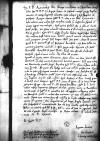⌊⌋ Reverendissimae Dominationis Tuae VI Augusti datas X Septembris accepi easque ⌊⌋, et utroque elegantissimo, adauctas, satis alioqui per sese amplas et prolixas. Recepit interea Reverendissima Dominatio Tua alias a me ⌊⌋ ⌊Cracoviae⌋, ubi nuntius meus multis haesit mensibus multo cum dispendio sumptuum et curarum, ingenti mea molestia; quod aequius ferendum esset, si ullo cum fructu factum fuisset. Fuit profecto admodum infortunata et illi et mihi ea profectio, nisi quod gaudeo Reverendissimae Dominationi Tuae aliisque nonnullis praelatis Regni Incliti ⌊Poloniae⌋ illic redditas fuisse litteras meas. Ceterum quonam animo nuncupatiunculam meam acceperint serenissimi domini reges, nondum scire potui. Accepi autem interea Reverendissimam Dominationem Tuam promotam esse ad episcopatum Premisliensem, nisi forte fallit me nominis propinquitas. ⌊Lubusensis enim episcopus⌋ scripsit mihi, ⌊Chaimensem⌋ esse factum Premisliensem, ⌊Premisliensem⌋ autem factum Plocensem, ⌊Plocensem⌋ vero esse nunc archiepiscopum Gnesnensem. Quod et antea audivi. Deus omnibus bene vertat.
Quantum ad scriptas attinet contentiones, fateor ultro, me omnino saturum esse contentionum, quos aliquot annos cum ⌊Germaniae⌋ haereticis exercui. Nunc vero novis nos contentionibus provocant ⌊Angli⌋. De quibus Reverendissimae Dominationi Tuae plura constare arbitror, quam mihi. — Est ⌊⌋ tenui meo iudicio pulcherrima. Ceterum ea de re exstat perquam elegans comoedia nova ⌊Gnaphaei⌋, quae Acolastus dicitur. — Est et ⌊Nurnbergae⌋ in Teuthonico quaedam scripta et hic ante menses aliquot acta. — De ⌊Cornelio Dupplicio⌋ iam diu nihil audivi. Quid ⌊Roffensi⌋ et ⌊Moro⌋ sanctissimis pariter et doctissimis viris contigerit, Reverendissimam Dominationem Tuam latere non puto, cum sit mari longe propinquior quam ego. Nec tutum est omnia cartis commendare. Reverendissima Dominatio Tua bene valeat mihique importunius obstrepenti clementer ignoscat.
Certe quod ⌊Ratisbonae⌋ rarius accessi ad Reverendissimam Dominationem Tuam verecundiae fuit non neglegentiae, multo minus fastus aut contemptus. Sciebam enim multos ultro accurrere, qui vices non redderent invitando, sumptus vero minime leves esse ubicumque sit ⌊caesar⌋. Erubui itaque saepius venire non vocatus. Veni aliquoties tunc ad ⌊regis Angliae⌋ oratorem, qui nunc ⌊archiepiscopus est Cantuariensis⌋, fax omnis huius incendii malorumque incentor. Vellem me rarius apud illum fuisse, fidem enim eius non satis tum perspexeram.
Iterum bene vale et ignosce, Praesul ornatissime.

